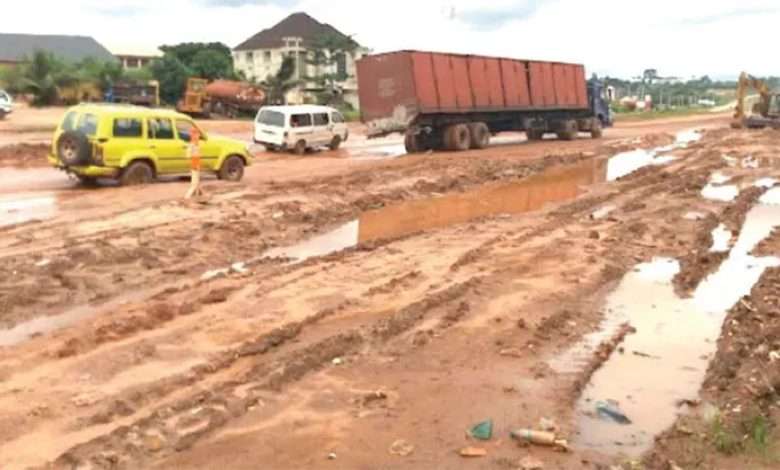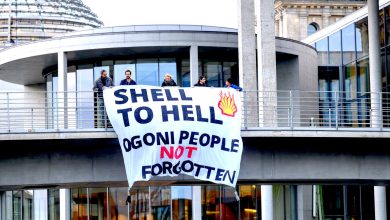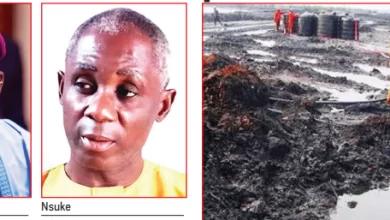East/West Road, Golgotha for N/Delta govs; all eyes on Umahi

n Christian theology, the word Golgotha connotes a frightening experience of danger. It is simply a place of suffering, difficulty or an outright death. Golgotha is therefore synonymous to Nigeria’s East-West road. It is one of the roads in the country that is as socio-economically important as it is infamous for negative reasons.
With over 740kilometers span and more than forty short bridges linking Calabar, Cross River state capital in the far flung South-South to Lagos state in the west, the road is the nerve that connects the nation’s oil and gas wealth to the rest of the world.
The deplorable state of the road today, leaves so much to be desired as it has become a death trap to the citizenry. According to available records, a trip from Calabar to Lagos on this road should be about ten hours and less than that duration from Port Harcourt, Rivers state capital to the same destination.
Unfortunately, traveling on the East-West road today, one needs to prepare to spend two or three days on the way before getting to his destination because of avoidable encumbrances in between.
The bitter experience of commuters spending many hours or days in the gridlock traffic that spans as long as over three kilometers stretch on both lanes of the road at Ologbo Kingdom in Benin, is what should be avoided like a deathly plague.
Heavy duty vehicles conveying goods like cows, iron rods, cement and some consumables from east to west and vice versa are forced to spend over two days at the dangerous spot from the head bridge at Koko in Delta state down to Benin City. The ditch causes some long trucks to tumble over thereby worsening any vehicular movement.
Drivers who have already spent days waiting patiently to see if help could come their way from the government to clear the fallen vehicles, will only need to do so in vain. Commuters who are in a hurry to catch up with important appointments will only need to cancel such deals as they could not meet up with the scheduled time.
Painting the grotesque picture of the unfortunate scene of the road, Amemegare Emmanuel, 52, who has plied that road as a commercial driver of one of the major transport lines said, “From Warri to Sagamu, the road is so bad. People have lost their goods on this road. The Ologbo side is terrible. The entire stretch is a write-off.
“I have driven on this road for the past ten years. The road started getting bad from the time of Goodluck (Jonathan) as President. People sleep on the road because of its bad state. In a country that one cannot afford flight ticket to fly to anywhere you want to go, can you embark on this type of painful journey with your family?”, he asked.
Lamenting at Ologbo while waiting for a space to squeeze his bus through the gridlock, Emmanuel expressed fear that if the road remains the way it is, “nobody will be able to travel along the East/West road again”.
He called on President Bola Ahmed Tinubu to declare a state of emergency on the road and ensure that a remedial work is urgently carried out now before the rains set in.
“THE Niger Delta Governors said this is a federal road, and the federal government must fix it. I don’t think it is right to continue to wait for the federal government to come and fix the road while the poor masses continue to suffer in search of their daily bread”.
According to him, “many broken down vehicles you are seeing here are as a result of overheat, punctured tyres and bad exhaust due to deep ditches. I have never experienced anything like this since I started driving more than ten years ago. To worsen it all, the by-pass in Benin, Edo state capital is a write off. That was supposed to be a detour to enable us avoid the busy traffic in the city”.
For Dada Memoye, 46 years, if he had the inkling that the East-West road was that deplorable, he would not have ventured to embark on the journey. “I drive this private truck. What is contained there is iron for construction in Port Harcourt. This is my second day at this place (Ologbo Kingdom). No movement. I have been driving since 1999. This road has been bad for the past four years. If I knew the road was at this terrible state, I wouldn’t have come”.
Also revealing her experience about the state of the East-West road logjam, a female student of Theater Art and Film Studies from the University of Port Harcourt expressed disappointment that she could witness such a fairy tale on the first day of plying the road.
“I am a student of Uniport. I have watched this bad road on you-tube and Instagram, I never envisaged that it could be this bad. This is about the first time I am passing through this route and the experience is so uncomplimentary. Our driver said that this is just the first phase of the holdup. Another one is at Ughelli (Uweru) or so. We have been here for the past five hours. There is no guarantee that we will get to Port Harcourt tonight.
The state of road network in Nigeria generally is a true reflection of the years of decay in the country despite its abundant wealth in oil and gas. This is why Joseph Ambakederimo, Board of Trustees Chairman, community development committee of Niger Delta oil and gas producing areas, CDC, said the Ologbo portion of the Benin-Warri Highway road is best referred to as “a shame of a nation”.
Ambakaderimo noted that “the portion of the road has become a recurring decimal and a reflection of the failure of government at all levels. When you consider the man hour and loss of goods you can better imagine the impact this can have on the economy.
Statistics show that Nigeria is not among the top 30 countries in Africa with good or passable roads. It is shocking that Namibia tops the list of countries with the best road network while the self-acclaimed “giant of Africa” comes up a distance 31 on the index. One therefore wonders where the trillions of naira budgeted for road construction and repairs have been channeled to over the years.
The economic importance of the East West road which looks deliberately abandoned by every successive government, cannot be over-emphasized. It cuts across the major state players in the oil and gas business in the country. Bonny kingdom in Rivers state, for instance, is the nation’s home of gas with reserves in excess of billions of dollars.
The Eleme axis also in Rivers state connects the two refineries there to the rest of the country. It equally connects Onne where Nigeria boasts of over 1000 companies operating maximally with a deep seaport and a free zone spinning revenues into the federal reserves. Driving on that road to Eleme is synonymous to taking a dangerous trip to a Golgotha.
On several occasions, containers carrying goods would snap off and fall on other vehicles, killing occupants in the process, yet, government would not budge. Many tankers have been destroyed by the unfortunate state of the road in the course of conveying petroleum products to other parts of the country.
Awarded in 2006 to assuage the public outcry of the Niger Delta youths who took to militancy to express their displeasure about the state of things in the region, the east west road was initially budgeted by the government of President Olusegun Obasanjo at the cost of N211billion without any design or master-plan. The project only remained as a mere political slogan all through Obasanjo’s tenure in 2007.
Late Chief Tony Aneni (Mr. Fix), an indigene of the south-south was the Minister for Works in Obasanjo government. Unfortunately, he could not fix the road until his demise.
In his time as President, Goodluck Jonathan, from Bayelsa state reviewed the contract sum of the project from N211billion to a staggering N726billion, yet, the story was the same. More money, no job done. Some indigenes of the region said it was a shame for Jonathan to leave power without completing that important road project, at least, to boost the regional economy of the Niger Delta.
It will be recalled that Senator Godswill Akpabio, then Minister of Niger Delta Affairs had said that over N10billion was approved by former President Muhammedu Buhari government to fix the Eleme axis of the road. No reflection of such money on that project till date. Akpabio’s revelation was sequel to the action of the Ogoni youths who had to block that part of the road to drive home their grievances over government’s neglect of the project.
Just a fortnight ago, the Senate committee on the East West road visited the Rivers state Governor, Siminalaye Fubara to “invent” a workable idea on how to complete, at least, the Eleme-Ogoni section of the road.
The delegation which was led by the Senate Adhoc Committee Chairman, Senator Abdul Ningi Ahmed, said the visit was predicated on a motion adopted by Senate concerning the East-West Road and they were physically assessing its current condition with public hearing to come later.
To prove that money has never been the problem for not completing the road but political will, Governor Fubara said there have been deductions from FAAC account by the federal government to fund critical national projects and wondered why the East-West Road was never captured and funded especially when it leads to locations where essential national economic assets are operational.
The governor emphasised that the most deplorable sections are not even more than a length of 20 kilometers from the Eleme junction interchange bridge into Ogoniland on the East-West Road, which cannot be too expensive for the federal government to handle.
“We have always complained about the dilapidated state of the East-West Road,
moreover, the Eleme junction to Onne route but nothing happened. It is a federal road, but it is my people that are suffering. So, I want to appeal to you, that it should not just be public hearing, or a question of how much was paid and not paid. You should move far from much talking to making actual commitment.”
Besides the direct intervention of the federal government, there are several sources through which money could be raised to work the road. Such multi-dimensional sources as the NDDC, Niger Delta Ministry, Ecological funds, 13% derivation across the states of the region among others, are sufficiently enough to provide adequate funds for the completion of the East-West road project. That is if there is the political will.
Too many talks. Plenty promises that have never been fulfilled. Nevertheless, in this era of “Renewed Hope”, will commuters on the East-West enjoy a hitch-free ride to their destinations, or they will continue to drip into the pathway of Golgotha!
All eyes now on David Umahi, President Tinubu’s minister of Works.
[Credit: VANGUARD]



